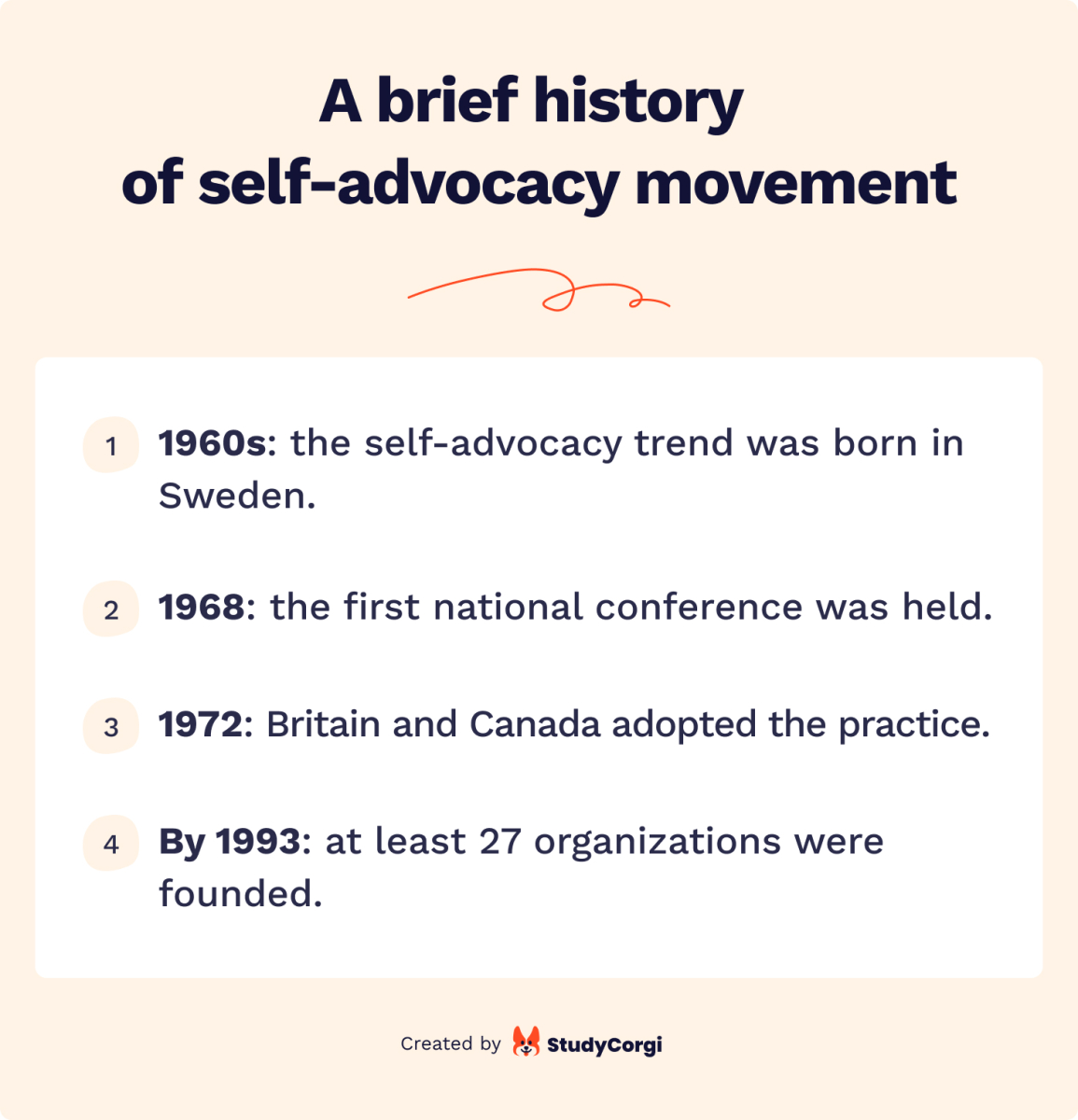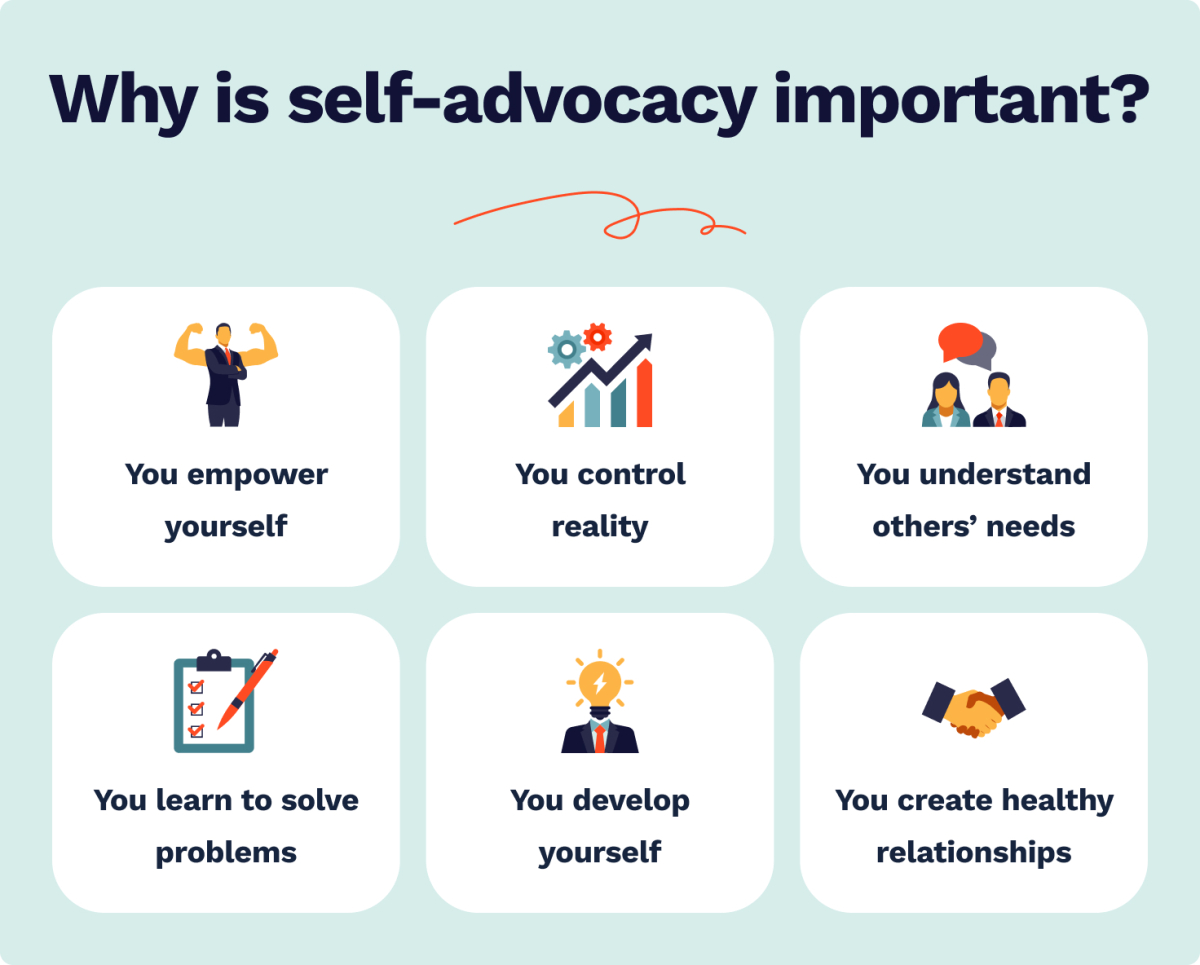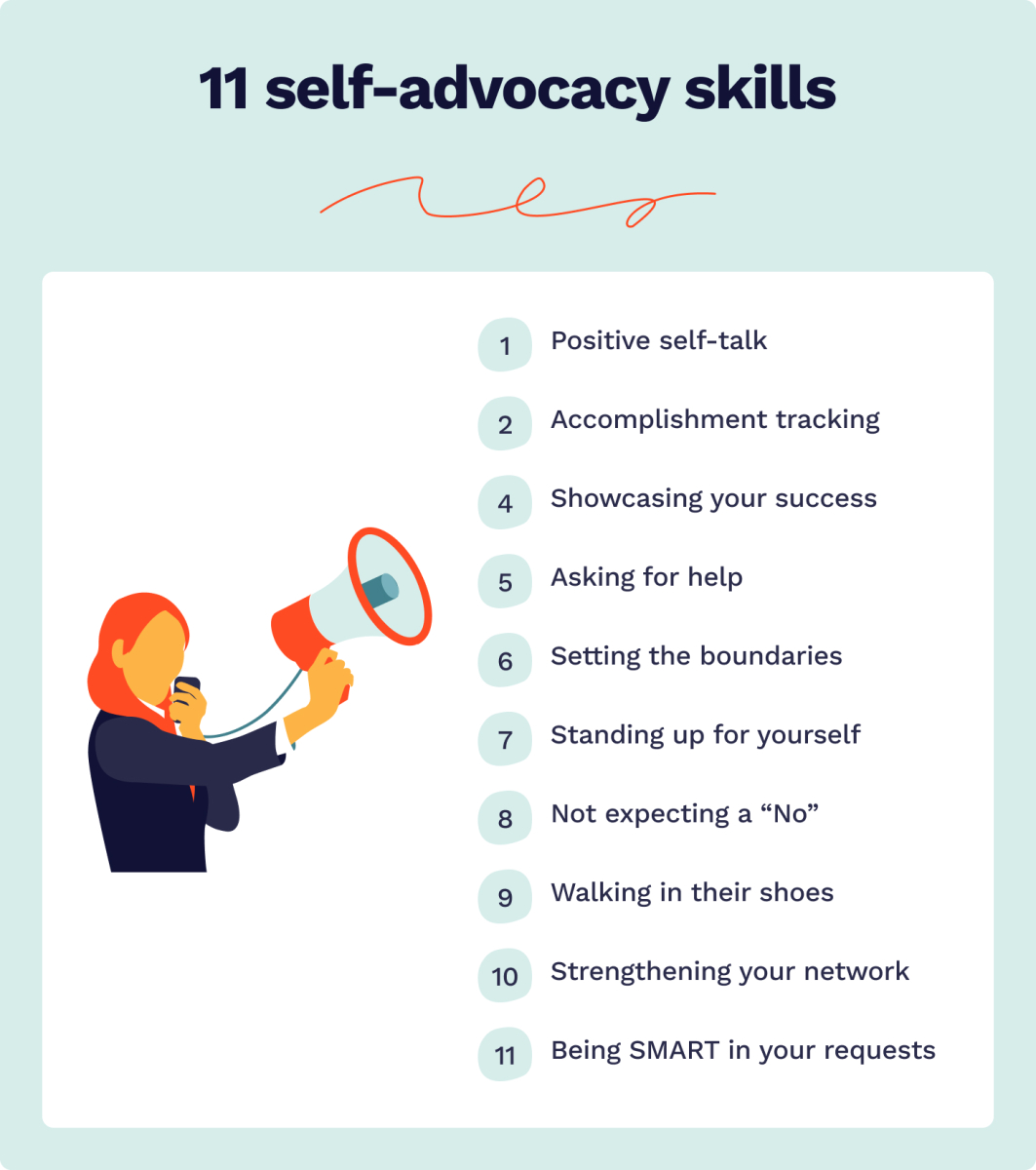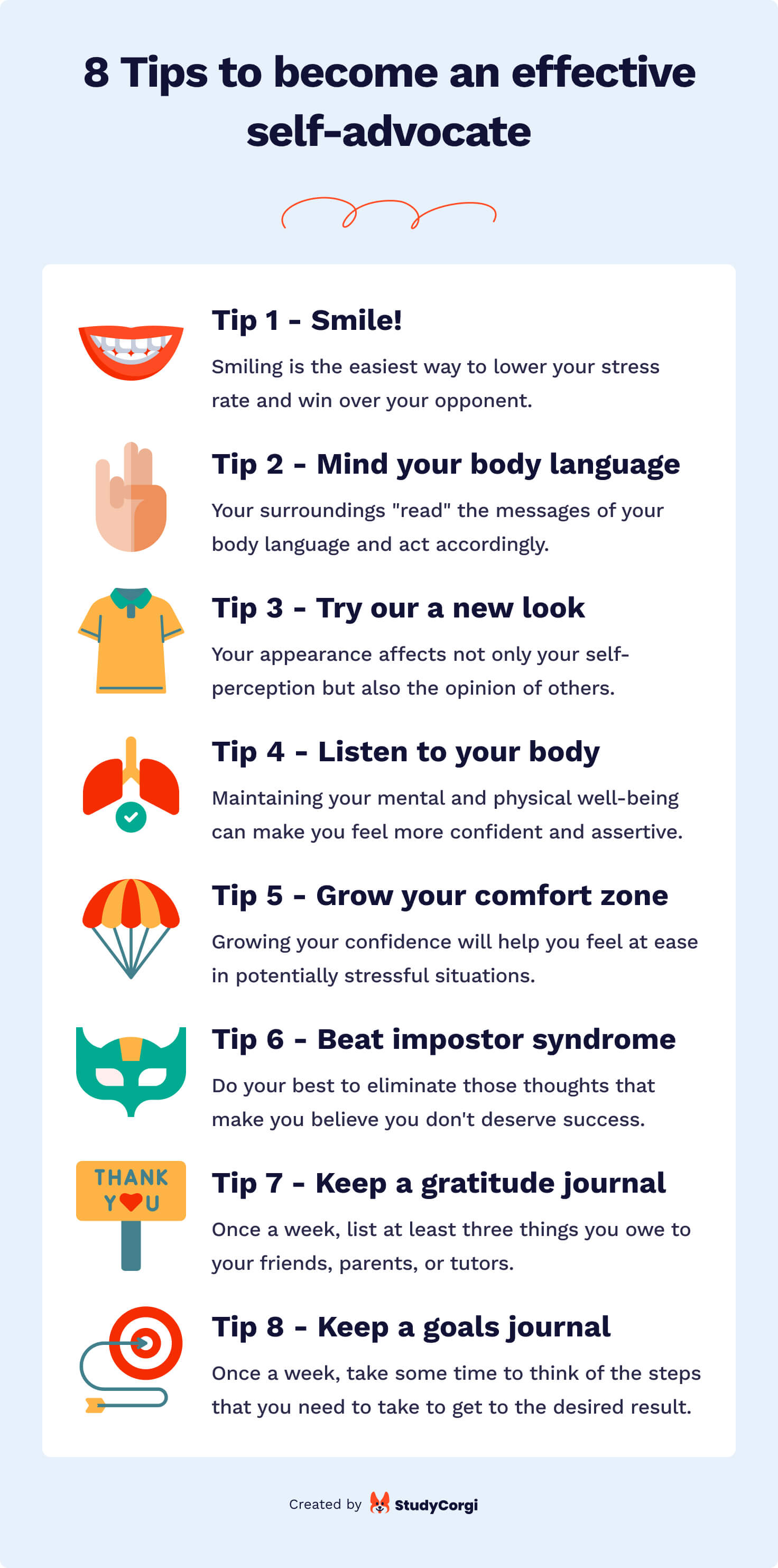Self-advocacy activities for students are sometimes underestimated, but they significantly help young people develop confidence and communicate their needs. The essence of self-advocacy in life is the ability to articulate and assert one’s needs clearly. So, if you know how to advocate for yourself in ways that improve your interactions with others, you might achieve true and full-scale self-love.
Sounds great, doesn’t it?
Yet, there are several nuances to know in order to master and benefit from self-advocacy activities. In this article, we’ve answered the crucial questions:
- What is self-advocacy, and why is it important?
- Which are the best self-advocacy activities for students?
Find this information and essential tips on how to practice self-advocacy with examples!

✊ What Does Self-Advocacy Mean?
Self-advocacy means respectfully speaking up for yourself and, whenever necessary, ensuring that your needs are met.
This skill also fosters your independence and empowers you to find solutions that may not be so obvious to others.
Self-advocacy consists of 3 milestones:
- Understanding your needs;
- Knowing how to meet them;
- Communicating the above two points to others.
The following examples of self-advocacy illustrate the idea.
Some may consider your actions to be selfish, but they are not. You are an important member of the community and have the same rights to education, respect, and convenience as any other person.
Thus, your actions in these cases are called self-advocacy.
📜 A Brief History of the Self-Advocacy Movement
The self-advocacy trend was born in Sweden in the 1960s. People with intellectual disabilities were encouraged to create and lead leisure clubs.
In 1968 and 1970, national conferences for the representatives of these clubs were held. The purpose was to let others know how they would like to be treated and show that a disability does not define a person.

In 1972, Great Britain and Canada adopted this practice. In fact, a conference for people with mental retardation was held in Canada in 1973. A group from Oregon attended but was dissatisfied with the event since they considered that professionals had dominated it. Upon their return, they created a self-advocacy group called “People First.”
By 1993, at least 27 self-advocacy organizations had been founded in the world.
Nowadays, these groups help people with mental retardation and other intellectual disabilities to develop leadership skills and increase their public presence.
📍 Why Is Self-Advocacy Important?
Self-advocacy becomes vital in social settings when we must coexist with other people who pursue their goals and have no concern for us. In these situations, we have to speak up and protect our own interests.
Oftentimes, we face these challenges in school or in the workplace. That’s why self-advocacy is essential during this part of our lives.
Although self-advocacy skills benefit everyone, underrepresented groups will find them particularly useful. The rights of ethnic or gender minorities and people with disabilities are often suppressed.

Thus, the benefits of self-advocacy are:
- You empower yourself. Being a passive onlooker has never made anyone happy. Self-advocacy teaches you to become an adult and take responsibility for your life. It shows you how to set boundaries and clarify your intentions to those around you.
- You control your reality. Take the initiative to change the world for the better! No one exists in isolation. When you become more empowered, other people also benefit from your advances.
- You learn to understand the needs of others. Self-advocacy trains your empathy. Besides, this skill helps you make better decisions and become a more pleasant speaker.
- You gain problem-solving skills. Self-advocacy revolves around resolving complex social situations. It teaches you to consider different perspectives and research the origin of the problem. Most importantly, you learn to find a solution that will benefit both sides of the conflict.
- You develop yourself. By participating in self-advocacy groups, you promote the ideas that matter to you and many other people. Meanwhile, you gain invaluable leadership skills that can be applied to other areas of your life.
- You create healthy relationships. Some of your current acquaintances will become your friends, partners, employers, or colleagues. The way you interact with them now will impact your future more than you can imagine!
🤺 11 Self-Advocacy Skills for a Student
Positive Self-Talk
How can you advocate for yourself if you are your strictest judge? Making friends with yourself can be challenging, but it gets easier with practice. There is a couple of positive self-talk techniques to help you with this point:
- Recall a situation from your childhood when you felt vulnerable. Imagine that you approach your past self. What words of support would you offer?
- Do you wear a ring or a bracelet? This game can turn your self-image upside down. Whenever you blame yourself for some mistake or think of yourself negatively, put the piece of jewelry on the other hand. A marker of success would be going an entire week without changing the hand.
Tracking the Accomplishments
As you can see, positive self-talk is a habit that anyone can cultivate. But no practice will last without a purpose behind it. Write down every time you reach your goal, no matter how small.
Use markers to highlight the importance of your accomplishments.
For example, choose blue to mark the minor goals and red for the most difficult.
This practice brings many more benefits than a conventional diary that laments your everyday life. It gives you the authority to stand up for yourself because you are worth it.
Believing You Deserve It
This skill is inextricably linked to the previous one.
Self-advocacy is all about your mindset. If you’re unsure that you’re worthy of something, making others believe in you will be hard.
However, don’t confuse this belief with entitlement. Thinking that someone owes you something just because you relate to a minority is not a good practice.

Instead, use your accomplishments to rationalize your right to the requested service. For instance, you have cleaned the room three times, so now it’s time for your roommate to take part in the dorm duties.
Showcasing Your Accomplishments
Never shy away from showcasing your success. We tend to underestimate other people’s efforts. That’s why you should always try to promote yourself and your accomplishments.
The key is to keep yourself focused on the facts. The diary we mentioned above will come in handy here. You could dedicate several pages to your study-related achievements and project contributions. That way, when the right moment comes along, you’ll know what to say.
You are likely doing a great job at college. But you’ll get average results if the professor fails to notice you.
For this reason, being visible is one of the most effective self-advocacy skills you can cultivate:
- Take actions that get you seen for the right reasons.
- Undertake the most challenging projects and be proactive in discussions.
- Share your knowledge with other students and lead an active social life.
Being Brave Enough to Ask for Help
If we were more decisive in vocalizing our needs, we would need fewer hours of psychotherapy. Don’t let life demolish you under the pressure of endless tasks and duties. There’s always something you can delegate.
Most of us are afraid to seek support out of fear of being rejected. But even if we are, the result will be the same! We’ll return to the starting point, where we are face to face with the problem again.
Did you know that the best managers aren’t those who know how to do the work better than anyone else in the company? They are those who know who can do the work for them.
If you are still ashamed to ask, suggest a service in return. For example, a person who cannot manage their homework because of ADHD could ask a friend to join them in doing homework and then offer to cook dinner for them.
Setting Boundaries
Never keep silent when your rights, property, or authority are infringed. Imagine you have a field of corn, and your neighbor’s goat comes along and eats some. “Not a big deal,” you think. But if the same thing happens every week, you’ll start to lose a large crop. Remember, this won’t happen if you tell your neighbor to keep the goat out of your property.
The same thing happens in communication.
Let others know what you won’t tolerate. Take a stand on issues that are critical for you. Say something if a groupmate takes credit for your share of work. If another person is treated better than you because they have a different skin color, address it.
Standing Up for Yourself
Unfortunately, no boundaries can protect us from unfriendly people. There will be situations when others deliberately insult you just because they want to. These moments create the worst memories. Still, you can make them less hurtful by responding to the offender. This way, the incident becomes a reminder of your power and decisiveness. You’ll raise your self-esteem and understand that you can ask for what you need in other situations.
Not Expecting a “No”
If you have ever dealt with children, you know that they intuitively understand how sincere your request is for them to behave. They will not listen to you if they sense that you are not sure they will follow your instructions. We have all been through this experience, so make sure that others know your limits. You can express them through the tone of your voice, your posture, your attitude, and many other details.
Consider practicing this skill by looking at your reflection in the mirror while talking. You’ll notice when and how you hesitate after several minutes.
Walking in Their Shoes
Some people don’t treat you correctly because of their own personal reasons. They may have had a bad day, or they might have health issues that make them irritated and angry.
Here’s an example: a tutor ignored your in-class question because she was immersed in her own thoughts. Perhaps her child was sick, and she was too concerned about their health to concentrate.
We agree that such an attitude is unprofessional, but in most cases, you are not the problem.
Strengthening Your Network
Having relationships with your peers makes your life more pleasant and meaningful. But believe it or not, your friends can also make you a better advocate for yourself.
Be transparent about your needs. Sincerity is the best basis for a lasting friendship. One day, they will take your side when you need a helping hand.
Being SMART in Your Requests
Poorly worded requests hardly ever get answered. But making a SMART claim means that it is:
- Specific (say what you need right away);
- Meaningful (say why you need it);
- Action-oriented (say what can be done about it);
- Realistic (limit your expectations to what is possible);
- Time-specific (specify the expected time frame).
🎯 8 Tips to Become an Effective Self-Advocate
Self-advocacy comprises many other helpful skills: self-confidence, the ability to create a positive impression, and decisiveness. This section provides 8 straightforward methods of developing these skills to help you stand your ground and get what you want.

Tip 1 – Smile!
Have you noticed how your heartbeat increases when you have to defend your interests? Smiling is the easiest way to lower your stress rate and win over your opponent. This simple element of body language encourages others to interact and demonstrates your good intentions.
Tip 2 – Mind Your Body Language
Your body reflects how confident or nervous you feel. Your surroundings “read” the messages of your body language and act accordingly. If you don’t think you deserve attention (hide your hands, sink your head into the shoulders, or generally “shrink” your body), others will not feel at ease around you.
Notice how self-confident people tend to stand, sit, and talk. Then, try to imitate them.
With time, these actions and postures will become second nature. Positive body language influences your self-perception. A power pose (hands on your hips, legs wide apart) can boost your confidence in stressful circumstances. Try standing like this next time you make a presentation.
Tip 3 – Try Out a New Look
It’s tough to be at the top of your game when your looks aren’t. Sometimes, new clothes can give you a self-confidence boost. Your appearance affects not only your self-perception but also the opinion others have about you.
Besides, new clothes can make you feel new yourself! With a different look, you can dare to act differently, think outside the box, and stand up for yourself.
Tip 4 – Listen to Your Body
Who will care about your needs if you don’t?
Maintaining your mental and physical well-being can make you feel more confident and assertive.
If you’ve slept well, had a good breakfast, and feel good about your body, you have the resources to do whatever you want.
Also, your well-being shows itself through your behaviors and appearance. And remember, no one ever trusts a grumpy person.
Tip 5 – Grow Your Comfort Zone
Everyone says you should leave your comfort zone. But sometimes, doing that can make you feel stressed, tired, and even frightened. Growing your confidence, however, will help you feel at ease in situations where most people would feel uncomfortable.
If you try to expand your comfort zone day by day, it will naturally grow, and with time you’ll be able to feel comfortable even as you do new things.
Let’s say that you’re afraid of public speaking. Making a speech in front of a large audience could cause you stress but expressing your thoughts to a group of friends might be more of a pleasant training.
Taking small steps can bring you tremendous results.
Tip 6 – Beat Your Impostor Syndrome
Impostor syndrome causes us to think that we’ve achieved something by chance instead of our hard work. Do your best to eliminate those thoughts that make you believe you don’t deserve success. The following two exercises will help you reflect on your accomplishments.
Tip 7 – Keep a Gratitude Journal
Noticing positive traits in others teaches you to do the same about yourself. Once a week, list at least three things you owe to your friends, parents, or tutors. What are you grateful for? You’ll be surprised how much others do for you.
Tip 8 – Keep a Goals Journal
Why do so many people become addicted to gaming? Simply put, games set achievable goals, break them down into steps, and offer a measurable reward. Why not do the same in real life?
Whenever an idea comes to you, note it in your journal. Once a week, take some time to think of the steps that you need to take to get to the desired result.
Make a timetable for each task and stick to it. Your life will become engaging in a way it never was before.
♟️ 6 Games & Exercises that Help Develop Self-Advocacy Skills
Gamification can make even the most daunting exercise more enjoyable. Below you can find a list of self-advocacy exercises in playable form. The qualities they develop will help you find the right words for each situation, no matter how stressful or unexpected it may be.
Chess
To win this game, you must rely on strategic thinking. Chess demonstrates that our current decisions always affect our future circumstances. It also provides immediate feedback on the “quality” of every action. It teaches us to anticipate changes and predict the outcome.
Monopoly
The best lesson we can draw from Monopoly is that you shouldn’t put all your eggs in one basket. There is always the possibility of failure. But if you distribute your assets among several options, you won’t lose everything. Diversify your investments, and never expect success from the first attempt!
Game of Life
Here you will learn that things never go as planned. Setbacks are inevitable. However, that doesn’t mean you should fall into despair and give up. Besides, this game offers more diverse scenarios than Monopoly and boosts your vocabulary. It also has a predetermined ending, which trains your inner clock.
Card Pieces
How can you develop communication skills without a team? Find enough people to create at least three groups of two. Diagonally cut playing cards and provide each team with an envelope containing an equal share of the card deck. Give 3 minutes to each team to find out which pieces they miss. Then give everyone 5 minutes to bargain the missing parts. The team with the most complete cards wins.
Letter to Yourself
This self-advocacy exercise can teach you how to understand and accept your dark side. Surprisingly, this skill is key to developing healthy self-esteem. There are 3 variants to try:
- A letter to your past self. You aren’t the same person you were five years ago. Think about your younger self as another personality. Embrace your differences and give yourself recommendations. Were there any situations in which you could have done better?
- A letter to your future self. What would you like to accomplish by the time you turn 18? 20? 25? The answer can tell you a lot about your goals, desires, and life philosophy. Keep these notes in your journal because they will be very rewarding to read when you grow older.
- A “thank you” letter. You deserve gratitude just like anyone else. Even more so, you are the most important person in your life! Why not thank yourself for the good things you’ve done?
Transforming Negative Self-Talk
Divide a sheet of paper into three columns:
Recognizing the triggers of negative thoughts and learning how to transform them positively is an excellent way to overcome them and raise your confidence. When you feel like slipping into negativity, replace those thoughts with more empowering ones. After all, most of our negative thoughts are not true.
🌐 6 Self-Advocacy Resources for Students, Parents, & Teachers
Check the list of resources below if you want to know more on the topic.
Some actions require a greater effort but, in exchange, bring greater benefit. This is true for self-advocacy. Please share your experience about standing up for yourself because other readers will find inspiration in your success.
